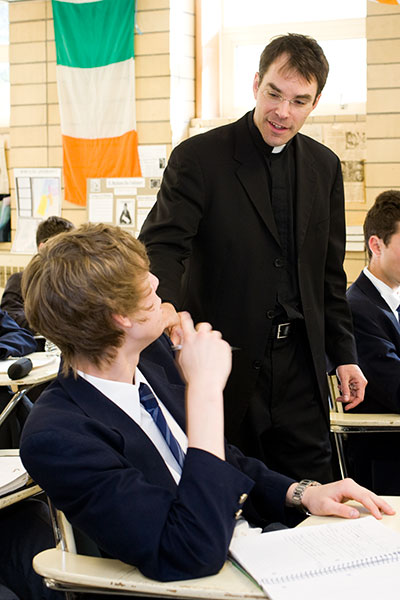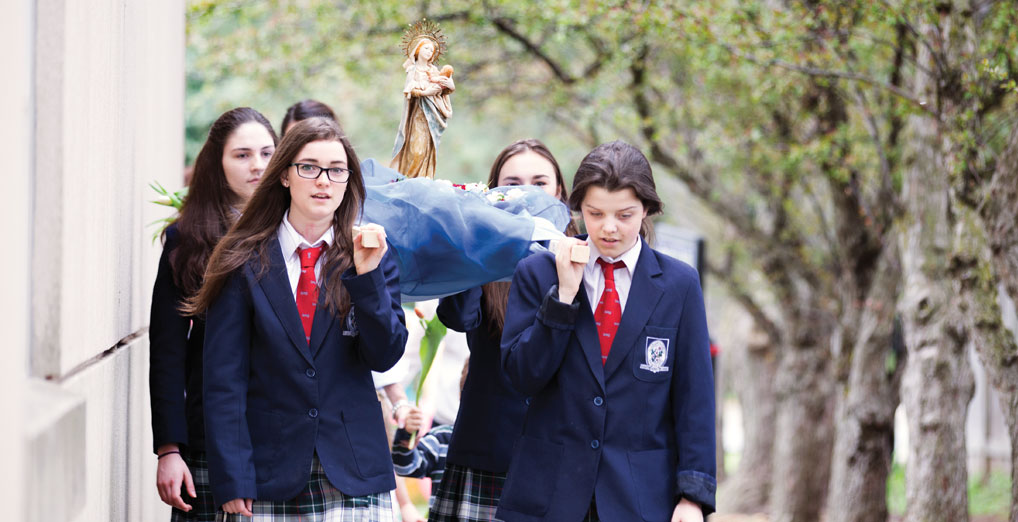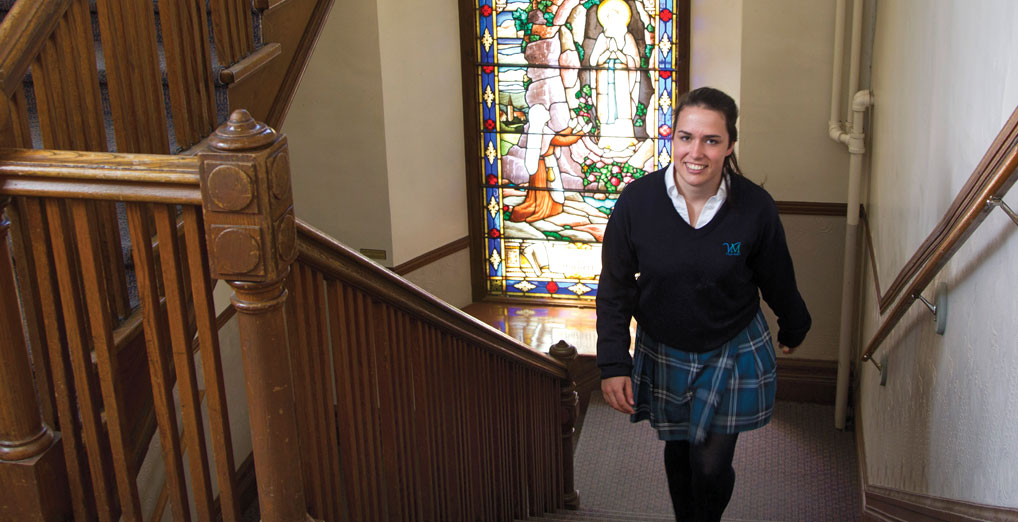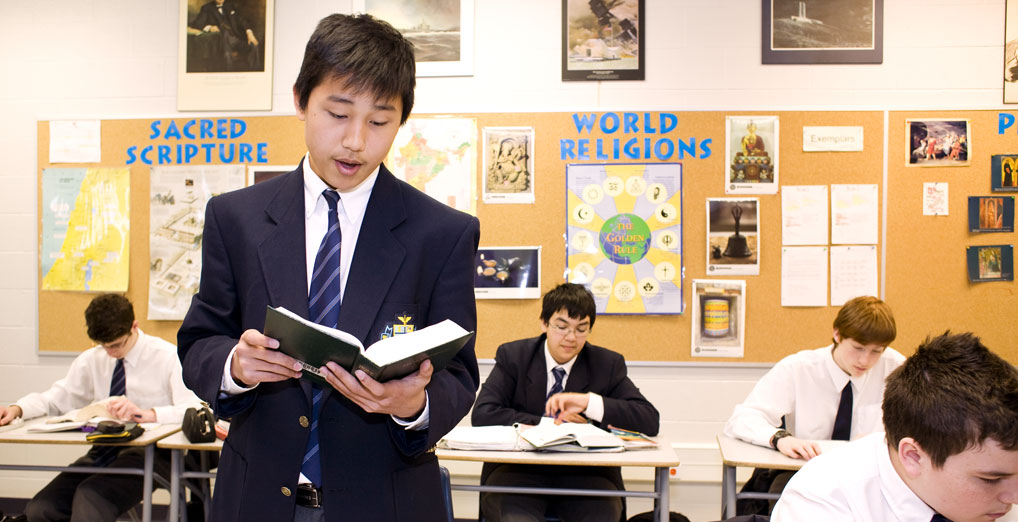On this page, we cover private Catholic schools in Canada.
For a discussion of faith-based education in general, including a detailed discussion of types of schools and curricula, check out our guide to religious-affiliated schools.
1 | List of Catholic schools |
|
"No other high school in the world has developed more Elite, Junior, Collegiate, USPORT, NCAA, National, Olympic or Pro athletes with over 215 in the NHL alone. ND graduates attend the top ranked universities worldwide.
—From the school
|
|
"We strive to take the best aspects of Catholic teaching & interpret it in a modern context for the confident young woman of today. They are imbued with a strong work ethic, sense of purpose & a desire to change the world
—From the school
|
|
King City, Ontario Keele St./King Rd. "Villanova College is York Region's only independent Catholic school offering Grades 4 to 12 in King City, Ontario. Average class size is 18 students. Specialty programs include STEM, AP and Domestic ESL." —From the school
|
|
Toronto, Ontario York Mills/Leslie "Hawthorn is the only independent, Catholic-inspired, all girls school in Toronto that provides character education, personal mentorship, and a classical liberal arts education that is university preparatory." —From the school
|
|
Toronto, Ontario York Mills Road/Don Mills Road "We value partnership with parents, creating a genuinely warm and friendly community. We raise the academic bar on academic excellence, and expectations of character, helping the boys become the best that they can be." —From the school
|
|
Ottawa, Ontario Donald St/Frances St "Promote academic excellence that stimulates the acquisition of language skills, the development of scientific and artistic competencies as well as the formation of a critical mind, in a multicultural environment." —From the school
|
|
Rigaud, Quebec Rue Saint-Pierre/Rue Bourget "Collège Bourget is a day & boarding school located between Montreal and Ottawa. French and English high school programs are offered. Bourget aims to foster personal autonomy, academic development, and perseverance." —From the school
|
|
Mississauga, Ontario "Guiding Light Academy is a Catholic private elementary school in Streetsville, Mississauga. We offer an enriched curriculum for JK, SK and Grades 1 to 8. We are located just minutes away from the Streetsville Go Station." —From the school
|
|
Calgary, Alberta Crowchild Trail/Flanders Ave. SW "Clear Water Academy is the only private Catholic school in Alberta. We offer a rigorous academic program from Jr. Kindergarten to Grade 12 for students of all faiths. 100% of our students pursue post-secondary education." —From the school
|
|
Mississauga, Ontario Hurontario/Queensway "Shepherd Montessori Private Catholic School in Mississauga offers Casa Montessori programs for children a ged 2.5 to 6. Before- and after-school care and summer camps also available." —From the school
|
|
Toronto, Ontario Bathurst St./St. Clair West "Canada’s only independent, Catholic school for boys in Grades 7-12, taught in the Basilian tradition of forming the mind, body, and soul. Since 1852, we have educated students in goodness, discipline, and knowledge." —From the school
|
|
Montreal, Quebec Atwater/Docteur-Penfield "Since 1861, The Sacred Heart School of Montreal, the city’s only all-girls English Catholic high school, has been preparing girls to change the world. We offer grades 7 to 12, day school and boarding." —From the school
|
|
Toronto, Ontario Avenue Road/St. Clair Ave. "De La Salle College is a Catholic, co-educational, university preparatory school in Toronto from Grade 5 to 12, with an average class size of 20 students and tuition at $17,550 - $18,500." —From the school
|
|
Toronto, Ontario Dufferin St/Lawrence Ave W "LDVA provides foundational education and challenges students to develop to their full potential. Officially recognized by the Italian Government, our unique curriculum incorporates Italian language and culture." —From the school
|
|
Etobicoke, Ontario "Quo Vadis, through a Polish-English bilingual program, aims to assist in the formation of well-rounded, responsible individuals, promotes academic excellence and encourages self-esteem within a Catholic environment." —From the school
|
|
Halifax, Nova Scotia "With a global network of schools around the world, a rich and proud history, and a strong and unique set of core values, Sacred Heart offers not just an education but an experience that is unparalleled in Nova Scotia." —From the school
|
Catholic schools are faith-based schools associated with the Christian denomination of Catholicism. Most Catholic schools, though, don’t require their students to be either Catholic or Christian.
In Canada, there are both public and private Catholic schools. Public Catholic schools are fully funded by the government and supervised by the Catholic School Board.
Private Catholic schools have lots of benefits. For instance, they provide a strong education in Catholicism, dedicated teachers who tailor instruction to individual learning needs, a close-knit community of peers and teachers, and an intensive and enriched dual-track curriculum.
Different schools have different approaches, policies, cultures, and developmental priorities. You should explore any prospective school closely, to determine whether it’s the right fit for your child and family.
We list private Catholic schools on this site. Moreover, our parent discussion forum allows you to discuss options and get answers to your questions.
2 | Unique features of private Catholic schools |
Roman Catholic schools, or what are often called simply “Catholic schools,” are one kind of religious-affiliated or faith-based school. They are a type of Christian school affiliated with Catholicism, and connected with the Roman Catholic church. In Canada, these schools can be private or public.
Private Catholic schools educate students in the Christian faith, with a particular focus on Catholic doctrines, beliefs, and practices. Like other Christian schools, they teach students Christian values such as respect, responsibility, family, and community. They also encourage students to grow in the Catholic faith. That said, most of these schools don’t require students to practice Catholicism, Christianity, or any other religion (at least outside of school). In fact, some schools admit students from non-Christian faiths.
For instance, Northmount, a private Catholic school in Toronto, Ontario, has many students who aren’t Catholic. Chris Ruch, their director of admissions, estimates that 47% of their students aren’t Catholic. While Northmount teaches Catholicism and basic Catholic beliefs, its students come from a wide range of backgrounds. And, the school is open to a wide range of views. “We don’t require our students to be Catholic or to subscribe, without questioning, to a Catholic or Christian beliefs or values,” says Ruch.
Some private Catholic schools are day schools, where students return home at the end of the day. Some are boarding schools, where students live five or seven days a week. Some, meanwhile, offer both day and boarding options.
Most private Catholic schools in Canada are coed. There are some Catholic boys’ schools and Catholic girls’ schools, though.
Religious studies curriculum
Private Catholic schools in Canada have a reputation for a strong secular and religious curriculum. On the secular side, knowledgeable instructors teach subjects such as math, science, English, and history in a rigorous manner. Teachers typically have a strong background in these subjects.
The religious studies programs in private Catholic schools tends to be rich and engaging. Kids often take several required religion or bible classes a term (which can make up more than a third of the curriculum). In these classes, kids learn about the Catholic bible, its application to life, and draw lessons from it. They also about the Catholic faith, values, and prayers.
Private Catholic schools educate students in the Christian faith, with a particular focus on Catholic doctrines, beliefs, and practices.
Students also learn about the seven holy sacraments of Catholicism, including confirmation and baptism. They also may learn about the theology of the body and communion, which are uniquely Catholic doctrines.
In some schools, religious studies are, at least to some extent, integrated with secular studies. This might mean infusing secular studies with a faith-based perspective, or studying secular subjects in a religious context (and vice versa).
Peter Bacardi, teacher and chaplaincy coordinator at Northmount School, uses this integrated approach as much as possible. He also believes this approach is part of an authentic Catholic education.
“While Catholic schools conform to government-mandated curricula, they should implement their programs with an overall religious orientation. Such a perspective includes criteria such as ‘confidence in our ability to attain truth, at least in a limited way—a confidence based not on feeling but on faith and the ability to make judgments about what is true and false.’ Unwavering commitment to truth is at home in an authentically Catholic school.”
An integrated curriculum can also involve teaching Catholic values as part of the overall curriculum. For instance, at Northmount School, there’s lots of focus on character education, or educating the whole person. Kids learn about different Catholic values, and meet with an advisor once a month to discuss them. As Bacardi puts it, this injects Catholicism into the whole curriculum and into students’ lives.
“We integrate the use of scripture with other areas of school life, such as the liturgies, character lessons, and daily prayer. Catholicism is a ‘comprehensive way of life’ that should animate every aspect of its activities and its curriculum. To deliver on the promise to provide students with a Catholic education, we must foster love for wisdom and truth, and must integrate this with faith, culture, and life.”
Religious observance and Catholic prayers
In many private Catholic schools, kids go to Catholic mass on a regular basis. This might be anywhere from once a week to several times a day. In mass, kids pray with their peers and teachers. They also often say grace, a prayer of thanks, before meals.
In some schools, kids are given the option of going to confession. At confession, they say repentance and ask for forgiveness for moral transgressions.
Kids sometimes go to assemblies to pray and discuss the Catholic religion. And, there’s a long tradition of giving to charities among Catholics (and other Christians), such as shelters and food banks, especially during Christmas and Easter. Catholic traditions such as Lent are observed, during which students aren’t allowed to eat meat on Fridays.
A real attempt is made to teach students the Catholic faith, and how to live by it. Schools try to get students to integrate faith-based principles into their lives. This can be achieved in a number of ways. It might involve acting with kindness and generosity, giving to charity, participating in community projects, and many other kinds of activities.


3 | Private versus public Catholic schools |
Almost all religious-affiliated schools are private, due to the separation of church and state in North America. In Canada, one exception is Catholic schools. Some Catholic schools, in many provinces in Canada, are fully or partially funded by the government. Catholic schools that are fully funded are considered public and are part of the Catholic School Board..
Private Catholic schools in Canada aren’t fully funded by the government. This means parents will need to pay for these schools. Despite this fact, these schools are a great option for many parents. In these schools, courses can be taught with fewer constraints, and teachers can use diverse instructional approaches—tailored to meet their students’ wide range of learning needs. These schools also often have smaller classes and lower teacher-to-student ratios than public schools.
Lauren Lowry moved her two kids, Oliver (age 11) and Thomas (age 7), from a public to a private Catholic school—Northmount. She’s been extremely happy with the change. “At Northmount, the curriculum is more demanding, and the teachers are more dedicated and passionate. There are also more enrichment opportunities than in the public school system. Oliver and Thomas have acquired better work habits, and are more engaged in school.”
Beth Duffy also enjoys the advantages of a private Catholic school. Her kids, Rachel (grade 11) and Eddy (graduated) have thrived at Villanova college, a private Catholic school in King City, Ontario. “Villanova is a home away from home. The teachers have helped my kids grow as persons. They experience life triumphs and defeats; that presents a lot of learning opportunities."
This is not to say private is always the way to go. But private Catholic schools do have distinct advantages—advantages shared by many other private schools. There are some great private Catholic schools in Canada, including in Toronto, Brampton, and Mississauga.
For a more in-depth discussion of these issues, see our coverage of private vs. public schools.
4 | Benefits of private Catholic schools |
Private Catholic schools in Canada have lots of significant benefits. For starters, many of them have very strong religious studies programs.
For instance, Guiding Light Academy, in Mississauga, Ontario, provides authentic religious education through their Catholic spiritual guidance program. This program is managed by Lumen Veritatis and the brothers of the heralds of the gospel. Jonah Jackson, director of Guiding Light Academy, explains the unique value of this program:
“Our classes are taught by real clergymen—the brothers of the heralds of the gospel. The brothers also help students develop their spiritual guidance programs. Not many schools offer this kind of program. We offer a unique and authentic Catholic education.”
Private Catholic schools also have several other important benefits. We discuss some of the main ones below.

5 | Choosing a private Catholic school |
In your search for the right Catholic school, it’s important to speak with teachers, educators, and your child.
Start looking at these schools early, as much as a year before applying. You can research them here on this site (starting with our list of schools), on school websites, at open houses, during on-site visits, at our annual school expos, and other venues.
Questions to ask prospective schools
There are some key questions to ask schools you’re looking into.
Beyond these more general questions, there are also specific questions to ask private Catholic schools. These include:
Questions for private Catholic schools
It’s best to discuss these questions with the school head, as well as teachers. It’s also a good idea to do a classroom visit and talk to other parents, to get a sense of teaching philosophies, school culture, and the like.
Keep in mind, different schools have different curricular approaches, policies, developmental priorities, and the like. It’s important to gather as much information as possible before making a decision. This is sure to improve your chances of finding a school that’s the right fit for your child and family.
6 | Paying for private Catholic school |
There are plenty of resources to help you pay for private Catholic school. Financial aid is quite common, with Catholic schools offering lots of scholarships and grants. Students who are accomplished or involved in a particular area, such as academics, art, community service, or athletics, may be eligible for a scholarship. If you can demonstrate need, you may also be eligible for a bursary to help subsidize your child’s education.
In many provinces in Canada, paying for a religious-affiliated school counts as a charitable donation, for which you can receive a tax break. Speak with a provincial government official for more information or read our guide on tax breaks for private school education.
7 | Frequently asked questions about private Catholic school |
There are some questions commonly asked about private Catholic schools. Some of these have already been answered, and so won’t be addressed here. We’ll only answer those that haven’t yet been answered or fully answered.
Does my child need to be Catholic?
Not typically. Most private Catholic schools don’t require their students to be Catholic, or even Christian, to attend their school. Some very traditional Catholic schools, though, may require this.
Will my child need to perform Catholic prayers or go to Catholic mass?
Some traditional private Catholics schools may require kids to pray or perform other religious rituals. Less traditional schools don’t require kids to pray or perform other religious rituals, though they may ask them to go to mass.
Does my child need to believe in God?
Not typically. The vast majority of private Catholic schools don’t require kids to believe or profess belief in God. On the other hand, some very traditional schools may assume their students believe in God. It’s unlikely, though, they’ll require them to profess their belief.
How strong is the secular curriculum?
Most schools meet and surpass the curriculum standards set by the provincial government of Ontario. Moreover, some kids find the dual-track curriculum of these schools challenging. Some also find it enriches their secular studies—in a way that can’t be achieved at many schools without a religious affiliation.
Some kids find the dual-track curriculum of private Catholic schools challenging. Some also find it enriches their secular studies—in a way that can’t be achieved at many non-denominational schools.
Do private Catholic schools make religious studies mandatory?
Most do. Some, though, have only optional religion courses. These schools, though, are usually Catholic secondary schools (high schools), and have lots of extracurricular religious activities, such as prayers, scripture readings, and assemblies.
How do I know if a private Catholic school is the right fit for my child?
You need to look for a good match between your child and the school in terms of religion, academics, culture, values, and the like. Keep in mind that private Catholic schools can differ from other Christian schools in important ways. You should also consider the pros and cons of private vs. public Catholic schools.
As Barbara Bierman, executive director of the Ontario Federation of Independent Schools, puts it:
“Parents have to look for what best matches the environment in their home. That may be a cultural, religious, or pedagogical decision. They should be asking themselves: How does my child learn best? What sorts of schools match up to our faith system? Parents also need to consider the spectrum of different religious orders. For instance, Christianity has several denominations, so they need to look into that detail when considering faith-based schools.”
Is a private or public Catholic school better for my child?
There’s no right answer here. Public Catholic schools are free, and many can give your child a strong secular and religious education, supervised by the Catholic District School Board.. Private Catholic schools, though sometimes costly, often have smaller classes, lower teacher-to-student ratios, more tailored instruction, strong extracurriculars, and other advantages over public Catholic schools. In short, they share many of the same benefits of private schools in general.
How much is tuition?
This varies, just as it does for all types of private schools. That said, on average, the tuition at private Catholic schools tends to be lower than other types of private schools. And remember, many of these schools offer significant subsidies and tax breaks.
Are private Catholic schools accredited?
Not by the government. No private school in Canada, religious-affiliated or not, is accredited by the federal or provincial government. High schools, though, must meet provincial curricular requirements. And, some private Catholic schools are accredited by independent institutions.
What kind of training should teachers have?
This varies based on the school and the subjects taught. To teach math and science, a strong background in these subjects is needed. To teach both secular and religious subjects, a proper secular and religious education (in the relevant subjects) is needed. Teacher’s college and specialized training in Catholic and Christian studies are also pluses.
Is French offered?
Private Catholic schools, like all private schools in Canada, aren’t required to offer French. That said, almost all private schools do offer French, beginning in the early grades. And, most schools make French a required course up until grade 9, like public schools in Ontario.

8 | Compare private Catholic schools |
Primary curriculum | Secondary curriculum | Curriculum pace | Academic culture | Average class size | Language immersion | Special needs support | Tech integration |
|
|---|---|---|---|---|---|---|---|---|
Athol Murray College of Notre Dame | Traditional | Standard-enriched | Rigorous | 12 to 18 | Full-time Dedicated Class | Heavy integration | ||
Holy Name of Mary College School | Progressive | Accelerated | Rigorous | No support | Heavy integration | |||
Villanova College | Traditional | Accelerated | Rigorous | 16 to 20 | Resource Assistance | Heavy integration | ||
Hawthorn School | Liberal Arts | Accelerated | Rigorous | 8 to 15 | No support | Light integration | ||
Northmount School | Liberal Arts | Accelerated | Rigorous | 12 to 18 | No support | Light integration | ||
Academie Providence | Montessori | Standard-enriched | Rigorous | 8 to 20 | Full-time Dedicated Class | Medium integration | ||
College Bourget | Traditional | Standard-enriched | Supportive | Resource Assistance | Medium integration | |||
Guiding Light Academy | Traditional | Montessori | Accelerated | Rigorous | 5 to 16 | No support | Heavy integration | |
Clear Water Academy | Liberal Arts | Standard-enriched | Rigorous | 15 to 20 | No support | Medium integration | ||
Shepherd Montessori Private Catholic School | Standard-enriched | 10 to 15 | No support | |||||
St. Michael's College School | Liberal Arts | Standard-enriched | Rigorous | 21 | Indirect Support | Medium integration | ||
The Sacred Heart School of Montreal | Traditional | Accelerated | Rigorous | 14 to 18 | No support | Medium integration | ||
De La Salle College | Liberal Arts | Accelerated | Rigorous | 18 to 22 | No support | Medium integration | ||
Leonardo Da Vinci Academy of Arts & Sciences | Traditional | Montessori | Standard-enriched | Rigorous | No support | |||
Quo Vadis Elementary School | Traditional | Accelerated | Rigorous | 8 to 16 | No support | |||
Sacred Heart School of Halifax | Traditional | Standard-enriched | Rigorous | 15 to 20 | No support | Medium integration |
Legend:
Athol Murray College of Notre Dame | ||||||||||||||||||||
Holy Name of Mary College School | ||||||||||||||||||||
Villanova College | ||||||||||||||||||||
Hawthorn School | ||||||||||||||||||||
Northmount School | ||||||||||||||||||||
Academie Providence | ||||||||||||||||||||
College Bourget | ||||||||||||||||||||
Guiding Light Academy | ||||||||||||||||||||
Clear Water Academy | ||||||||||||||||||||
Shepherd Montessori Private Catholic School | ||||||||||||||||||||
St. Michael's College School | ||||||||||||||||||||
The Sacred Heart School of Montreal | ||||||||||||||||||||
De La Salle College | ||||||||||||||||||||
Leonardo Da Vinci Academy of Arts & Sciences | ||||||||||||||||||||
Quo Vadis Elementary School | ||||||||||||||||||||
Sacred Heart School of Halifax |
| Tuition (boarding school) | Students receiving financial aid | Grade eligibility for financial aid | Avg. aid package size (annual) | |
|---|---|---|---|---|
Athol Murray College of Notre Dame | $23,900 to $55,425 | 30% | 8 - 12 | $10,000 |
Holy Name of Mary College School | 15% | 5 - 12 | $1 | |
Villanova College | 4 - 12 | |||
Hawthorn School | 35% | JK - 12 | $8,000 | |
Northmount School | 5% | JK - 8 | $2,500 | |
Academie Providence | 35% | 1 - 8 | $40 | |
Clear Water Academy | 20% | 1 - 12 | $5,000 | |
St. Michael's College School | 20% | 7 - 12 | ||
The Sacred Heart School of Montreal | $45,116 to $65,828 | 30% | 7 - 11 | $8,300 |
De La Salle College | 18% | 5 - 12 | $12,500 | |
Leonardo Da Vinci Academy of Arts & Sciences | 15% | 1 - 8 | $5,000 | |
Sacred Heart School of Halifax | 13% | 1 - 12 | $7,120 |
9 | Further resources |
To discuss Catholic schools and private school education in general, go to our parent discussion forum.
The following associations provide support to Catholic schools: